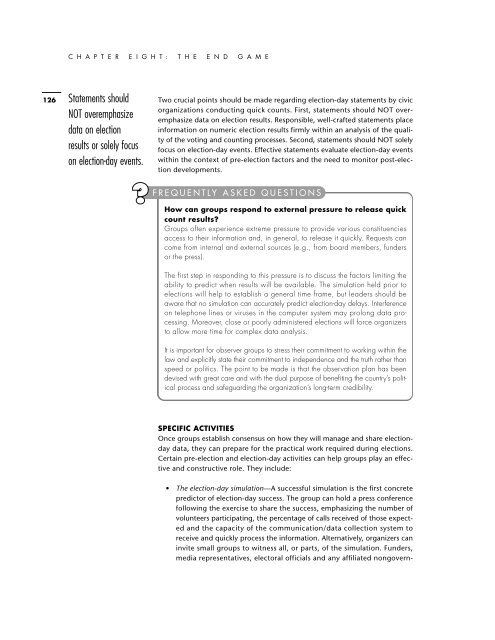The Quick Count and Election Observation
The Quick Count and Election Observation
The Quick Count and Election Observation
You also want an ePaper? Increase the reach of your titles
YUMPU automatically turns print PDFs into web optimized ePapers that Google loves.
C H A P T E R E I G H T : T H E E N D G A M E<br />
Statements should<br />
NOT overemphasize<br />
data on election<br />
results or solely focus<br />
on election-day events.<br />
126 Two crucial points should be made regarding election-day statements by civic<br />
organizations conducting quick counts. First, statements should NOT overemphasize<br />
data on election results. Responsible, well-crafted statements place<br />
information on numeric election results firmly within an analysis of the quality<br />
of the voting <strong>and</strong> counting processes. Second, statements should NOT solely<br />
focus on election-day events. Effective statements evaluate election-day events<br />
within the context of pre-election factors <strong>and</strong> the need to monitor post-election<br />
developments.<br />
How can groups respond to external pressure to release quick<br />
count results?<br />
Groups often experience extreme pressure to provide various constituencies<br />
access to their information <strong>and</strong>, in general, to release it quickly. Requests can<br />
come from internal <strong>and</strong> external sources (e.g., from board members, funders<br />
or the press).<br />
<strong>The</strong> first step in responding to this pressure is to discuss the factors limiting the<br />
ability to predict when results will be available. <strong>The</strong> simulation held prior to<br />
elections will help to establish a general time frame, but leaders should be<br />
aware that no simulation can accurately predict election-day delays. Interference<br />
on telephone lines or viruses in the computer system may prolong data processing.<br />
Moreover, close or poorly administered elections will force organizers<br />
to allow more time for complex data analysis.<br />
It is important for observer groups to stress their commitment to working within the<br />
law <strong>and</strong> explicitly state their commitment to independence <strong>and</strong> the truth rather than<br />
speed or politics. <strong>The</strong> point to be made is that the observation plan has been<br />
devised with great care <strong>and</strong> with the dual purpose of benefiting the country’s political<br />
process <strong>and</strong> safeguarding the organization’s long-term credibility.<br />
SPECIFIC ACTIVITIES<br />
Once groups establish consensus on how they will manage <strong>and</strong> share electionday<br />
data, they can prepare for the practical work required during elections.<br />
Certain pre-election <strong>and</strong> election-day activities can help groups play an effective<br />
<strong>and</strong> constructive role. <strong>The</strong>y include:<br />
• <strong>The</strong> election-day simulation—A successful simulation is the first concrete<br />
predictor of election-day success. <strong>The</strong> group can hold a press conference<br />
following the exercise to share the success, emphasizing the number of<br />
volunteers participating, the percentage of calls received of those expected<br />
<strong>and</strong> the capacity of the communication/data collection system to<br />
receive <strong>and</strong> quickly process the information. Alternatively, organizers can<br />
invite small groups to witness all, or parts, of the simulation. Funders,<br />
media representatives, electoral officials <strong>and</strong> any affiliated nongovern-


